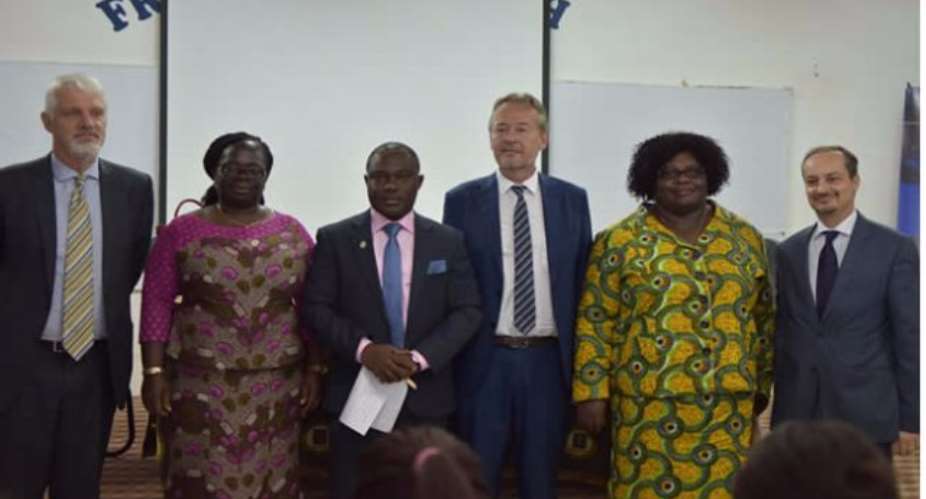A Research Fellow at the Legon Centre for International Affairs and Diplomacy Dr Juliana Appiah has deplored the increasing elitist posturing by the AU at the expense of grassroot participation.
The Lead Researcher says African leaders must publicise the immense benefits of the African Union in order to get the citizens fully involved in the integration process.
She was speaking at the second lecture series organised by the Centre for European Studies (CES) in collaboration with the German Embassy in Ghana.
The lecture was under the theme: "The European Union and Africa Union: A Comparative Study and Lessons for Africa Union."
Since its formation in 1963, the relevance of the African Union has remained a major debate with critics bastardizing the African leaders of being self seeking and highly incompetent.
On the other hand, the European Union, has largely been credited for building and developing citizens in these countries after a rather devastating two world wars.
But for the recent exit of Britain, the European Union has been a formidable entity in which individual countries pool their resources towards a common social and economic development.

Drawing similarities and differences between the European Union and the African Union, Dr Juliana Appiah said European citizens were left in no doubt, at least after the world wars, that a union of countries was the best way towards solving their challenges but that is not the case in Africa. African leaders have largely become elitist in championing the cause of African union without a strategic involvement of the grassroot.
"Like the EU, the AU must become independent financially and free itself from donors to take its rightful place on the global stage. Funding is crucial to most of the initiatives under the AU," she said, adding, "the AU should begin to initiate standards and rules that have continental reach like the EU has done. These standards can be in the fields of education, energy, transport and communication, environment, culture, tourism and the like."
The Chairperson for the occasion, Professor Henrietta Mensah-Bonsu, Director of the Legon Centre for International Affairs and Diplomacy (LECIAD), applauded the CES for its activism and relentless efforts to promote research and teaching in the area of European Studies, since its inception in August 2016.
She noted that the EU today serves as a powerful politico-economic union of close to thirty member states in Europe. It has developed several initiatives and interventions that have strengthened itself as a powerful bloc in world politics.
In his welcome remarks, Professor Ransford Gyampo, Director of the Centre said the lecture was in line with the Centre’s core mandate of providing research and teaching material in the area of European Studies.

He described the theme for the event as appropriate in Africa’s quest for proper integration as a tool for development. He thanked Ambassador Christoph Retzlaff, the German Ambassador to Ghana, together with his team of indefatigable and unfaltering staff for their support in making the Second CES Lecture Series see the light of day.
The lecture was attended by over 300 participants comprising students and faculty of the University, representatives of the European Union Member countries in Ghana, Africa Union Officials, Civil Society actors, policy makers, media practitioners and other key stakeholders and opinion leaders.
Story by Ghana|Myjoyonline.com





 COVID-19: GHS records 57% vaccination coverage
COVID-19: GHS records 57% vaccination coverage
 My government will support churches – Bawumia assures Clergy
My government will support churches – Bawumia assures Clergy
 Mahama, Bawumia and Alan have flatly failed Ghanaians – Kofi Akpaloo
Mahama, Bawumia and Alan have flatly failed Ghanaians – Kofi Akpaloo
 PAC warns public institutions to comply with the Public Procurement Act
PAC warns public institutions to comply with the Public Procurement Act
 Voter registration: NDC slams EC’s refusal to share serial numbers of BVR kits
Voter registration: NDC slams EC’s refusal to share serial numbers of BVR kits
 Akufo-Addo's 'corrupt, yenkyendi cronyism' cost Ghana $190m stake in US Millenni...
Akufo-Addo's 'corrupt, yenkyendi cronyism' cost Ghana $190m stake in US Millenni...
 Don't be 'conduit' to President Akufo-Addo's 'I can't hand over power to Mahama'...
Don't be 'conduit' to President Akufo-Addo's 'I can't hand over power to Mahama'...
 NDC's hypocrisy exposed as party executive implicated in registration of minors
NDC's hypocrisy exposed as party executive implicated in registration of minors
 PDS Scandal: The totality of our loss is the mess we seen in the power sector to...
PDS Scandal: The totality of our loss is the mess we seen in the power sector to...
 US Millennium Compact: It's disheartening for Ghana to lose $190 million power d...
US Millennium Compact: It's disheartening for Ghana to lose $190 million power d...
